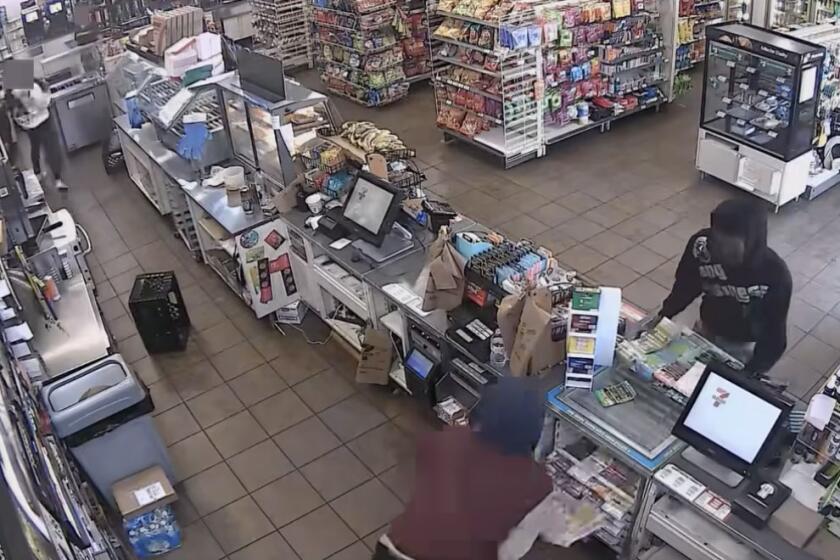The fear that’s keeping Iranian Americans from visiting their homeland

Sitting inside his empty travel agency in Los Angeles, Farhad Besharati expressed concern about the decline of his business.
The majority of his customers are older Persians who come to him when they want to purchase airline tickets to Iran. But lately, he said, some are canceling their flights, and fewer people are arranging trips.
Besharati blames recent arrests in his homeland of Iranians who hold dual citizenship, some of whom have received lengthy prison sentences.
Iranian Americans have increasingly found themselves pawns in a power struggle between the country’s hardliners and the more moderate-leaning President Hassan Rouhani, who has sought better relations with the international community.
Hope inspired last year by the signing of a nuclear accord between Iran and the United States and other world powers now commingles with fear, especially in Los Angeles, home to the largest Persian community outside Iran.
“My business is down 50%,” said Besharati. “[My customers] are asking what would happen to them if they go back to Iran. I tell them if they are not active in politics, they are safe.”
Many Iranian Americans were encouraged last January when four Americans, including Washington Post correspondent Jason Rezaian, were freed from jail in exchange for U.S. prosecutors dropping cases against 21 Iranians. The agreement came as economic sanctions against Iran were being lifted as part of the nuclear pact.
Optimism was stoked when Rouhani spoke to a group of Iranian Americans during the U.N. General Assembly in 2013, encouraging them and others to visit Iran.
“It is the natural right of every Iranian to be able to visit his or her homeland,” Rouhani told the crowd, according to the Iranian Tasnim News Agency.
But as some dual citizens returned to the nation of their births, they encountered trouble. Since his election in 2013, Rouhani’s administration has faced great opposition from Iran’s powerful Revolutionary Guard Corps, which seeks to undermine his influence and use dual citizens as leverage against Western countries, experts say.
Last summer, San Diego resident Reza “Robin” Shahini became one of several U.S. citizens detained in Iran, joining dual nationals from Britain and France who had been arrested earlier this year.
In late October, Iran sentenced Shahini to 18 years in jail for “collaborating with a hostile government.”
His prison sentence came a week after Iranian American businessman Siamak Namazi, who was living in Dubai before his arrest, and his ailing father, Baquer Namazi, were sentenced to 10 years in prison each on similarly vague charges of spying for the United States, according to a report by Mizan, the Iranian judiciary’s news service.
Shirin Jamshidi, a recent graduate of Columbia University’s School of International and Public Affairs, had spent part of last year arranging a trip to Iran with classmates but abruptly canceled it after Namazi’s arrest. Jamshidi says she was warned through various channels in Iran, both official and unofficial, not to come.
“It was very disappointing because as an Iranian, I truly wanted to give an opportunity for my friends from other backgrounds to go and experience [Iran],” Jamshidi said.
Omid Memarian, 42, an Iranian American journalist who fled Iran in 2005 after being imprisoned for his work, initially thought the situation might improve after Rouhani’s election.
I’m proud to be Iranian, but as long as the [Iranian] government is there, nothing is going to change.
— Bahman Bennett
Now he feels like it has gotten worse, even for those who are not politically involved. “The [Revolutionary Guard Corps] intelligence unit has become much stronger and are very paranoid about Iranians who live in the U.S., particularly journalists and academics,” he said.
Still, there are dual nationals who say they have visited Iran for more than 30 years without incident, many to see loved ones or take care of business.
Iran experienced a mass exodus after its 1979 Islamic revolution. As many as 500,000 people of Iranian descent live in Southern California — with over 100,000 alone living around Los Angeles, according to the Migration Policy Institute.
In August, the State Department updated its travel warning, advising that “Iranian authorities continue to unjustly detain and imprison U.S. citizens, particularly Iranian Americans, including students, journalists, business travelers, and academics on charges including espionage and posing a threat to national security.”
And because Iran does not recognize dual citizenship, its government treats them as Iranian citizens, making it much more difficult for the United States to provide assistance.
Faramarz Bolandpour, a Westwood businessman who helps Iranian Americans process their passports, said he’s noticed more people expressing concern about traveling to Iran.
“I tell them I don’t know what their situation is,” he said. “If something happens to them, I don’t want to be responsible.”
Barbara Slavin, who directs the Future of Iran Initiative at the Washington-based Atlantic Council, said that if a dual citizen is outspoken about Iranian politics, they need to be especially cautious. Otherwise, Slavin said, the vast majority of dual citizens should be able to travel to Iran without encountering problems with the government.
Smoking shisha, a flavored tobacco, while working on their laptops at an outdoor cafe in Westwood, friends Sasan Mirtorabi, 33, and Shervin Natan, 30, said they encourage young Persians to visit Iran. Mirtorabi, who visited Iran in August and travels there every two years, said that he’s never encountered troubles.
“I’m like zero scared to go,” he said. “It’s not like a widespread arrest of people going there.”
Natan, who has never been to Iran, said he is eager to visit and that his family goes back and forth often.
“My uncle lives six months out of the year in Iran,” he said. “I have Jewish friends and family who go all the time and have zero problems.”
But for some Iranian Americans, particularly exiles who fled during the 1979 Islamic revolution, returning to their birth country has never felt safe.
Memarian, whose immediate family lives in Iran, said he lost his mother and father in the past 18 months and felt devastated that he couldn’t see them. He keeps in touch with family through Skype, phone and social media on a regular basis.
Bahman Bennett fled Iran 27 years ago and doesn’t plan on visiting anytime soon, even though he still has family there.
Instead, Bennett maintains his cultural ties as the owner of a store that sells Iranian books, clothes and decorations in the heart of “Tehrangeles,” the moniker given to an area in Westwood where many Persians live and own businesses.
“I love my culture. This is my little Iran and for my community,” he said of his store. “I’m proud to be Iranian, but as long as the [Iranian] government is there, nothing is going to change. Our life here is established, and I cannot go back and start from zero.”
Follow me on Twitter @melissaetehad
ALSO
Donald Trump’s victory sparks optimism in an unlikely place: Iran
Another populist victory: Italian prime minister says he’s resigning after referendum defeat
Palestinian Authority leader Mahmoud Abbas consolidates control over his party
More Central Americans are giving up on the U.S. and looking instead to a Mexican dream
More to Read
Start your day right
Sign up for Essential California for news, features and recommendations from the L.A. Times and beyond in your inbox six days a week.
You may occasionally receive promotional content from the Los Angeles Times.







